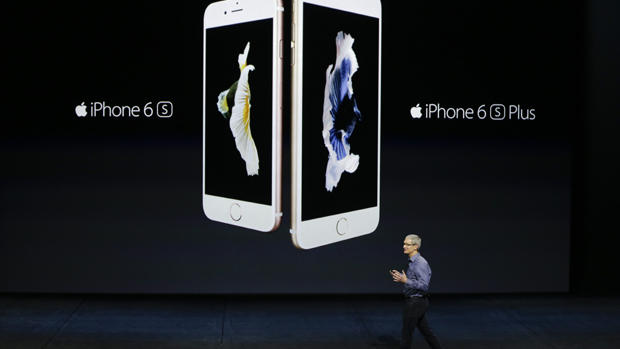5 things to know about Apple's iPhone upgrade plan
Part of Apple's (AAPL) new product announcements on Wednesday was a new upgrade program. Instead of buying the latest model iPhone from a wireless carrier, Apple wants you to buy direct in a program that offers a yearly upgrade.
The diehard Apple fan might consider the offer a no-brainer, but most people should consider what the plan offers and whether it ultimately makes sense for them. Here are five things to consider.
This is for the iPhone 6s and 6s Plus: The upgrade program is intended to push the two models Apple unveiled on Wednesday, the 6s and 6s Plus because the company isn't interested in promoting earlier models. Upgrades would begin in the fall of 2016, and the plan is initially available only through Apple stores, although you can make a reservation online.
You might pay more than you used to: The plan calls for a two-year installment agreement with Apple, so the idea of the longer financial commitment is shifted to the company from the carriers. The Apple plans start "From $32.41/month." But as often happens when discussing prices, the word "from" plays a prominent role.
That price refers to an iPhone 6s with 16 gigabytes of memory. The iPhone 6s Plus with the same memory would be $36.58 a month. Fully loaded with 128 gigabytes of memory, the 6s and Plus monthly costs are $40.75 and $44.91, respectively. That means a phone will cost between $777.84 (16-gigabyte iPhone 6s) and $1,077.84 (128-gigabyte iPhone 6s Plus) over the two-year plan. At full price, an unlocked 16-gigabyte iPhone 6s is $649. The 128-gigabyte iPhone 6s Plus is $949.
However, that's the cost to pay off one phone. If you upgrade, it's unclear from Apple's site whether the original two-year installment agreement extends because Apple still hadn't posted the plan details as of Thursday midday E.T.
Other companies have continuous upgrade programs that are less expensive. Verizon (VZ) offers an upgrade plan in which the price of the phone is split over 24 monthly payments without interest charges, meaning the $649 iPhone 6s with 16 gigabytes of memory is $27.04 a month, while the 128-gigabyte iPhone 6s Plus is $39.52 each month. Shopping around is imperative.
Compare the warranties: Some of the pricing difference is the inclusion of an AppleCare+ extended warranty. Still, you need to carefully compare the options. Going back to the Verizon plan, the carrier has a total equipment coverage program for $9 a month. It covers accidents, water damage and screen damage, as does AppleCare+. Add the $9 to the $27.04 lower-end iPhone monthly cost, and the total would be $36.04, versus $32.41 from Apple.
But do you really need a two-year extended warranty, especially if you'll be swapping out units after a year of manufacturer coverage? That means you'd be betting you won't drop the phone in water or crush the screen or lose the device, but the trade-off makes financial sense for many buyers.
You do get an unlocked phone: That can be a distinct advantage over what the carriers offer because Apple's plan doesn't tie you in with any one of them. If you buy from a carrier, the phone will be locked. However, under U.S. law, after you've paid for the phone, the carrier has to unlock it, which means you could take it anywhere after you own it.
You may not be tied in with Apple: It's fine if you would normally buy only Apple phones and would never think of switching. If you don't have that innate company loyalty, opting for an upgrade plan might seem to lock you into place. And it does, if you take the upgrade option. But once you've paid for a phone in total, there is no reason to extend the plan if you don't wish. If you buy full-price without financing, then you're free to do whatever you want from the beginning.
You may also not want every upgrade. However, you can still use an upgrade plan, whether from Apple or a carrier or other retailer, as a way to finance the phone, with or without an extended warranty.
